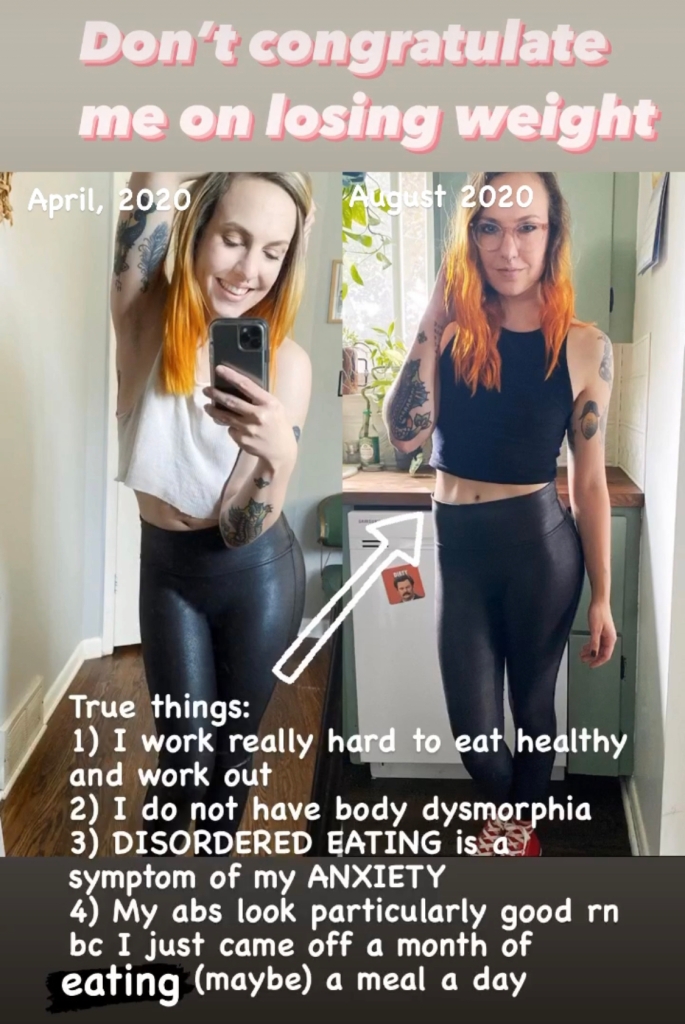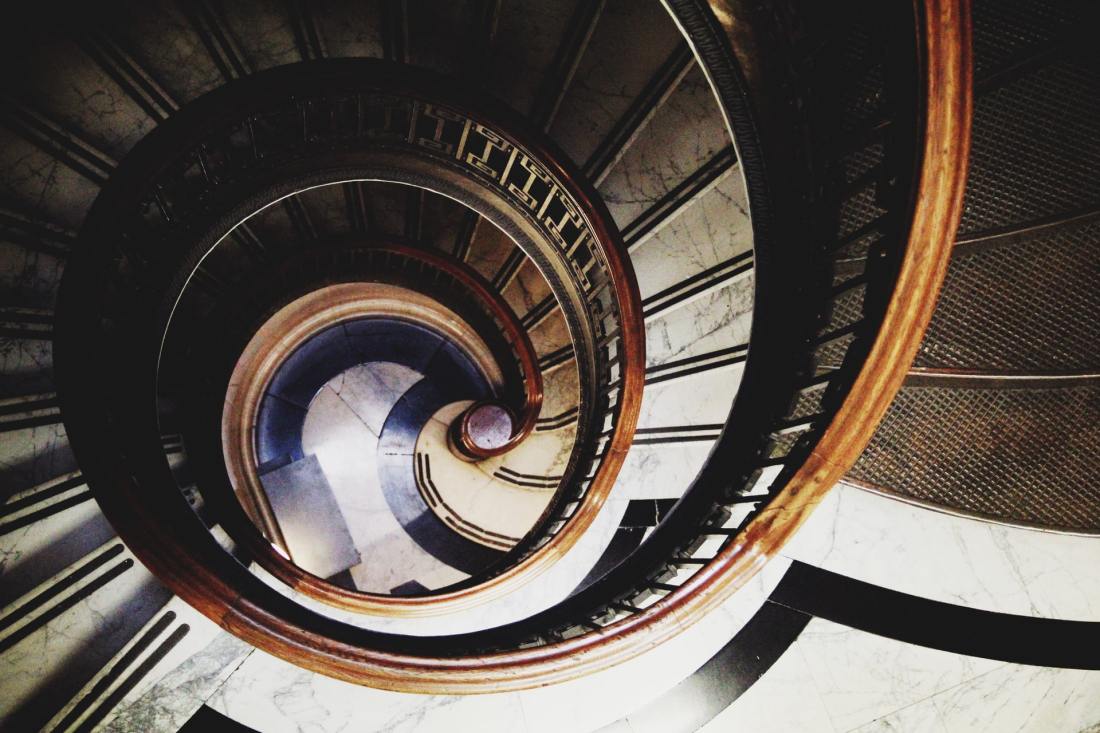A practice in getting myself out of bed in the morning

I struggle with feeling overwhelmed. I have ADHD, so my brain moves really fast. Often faster than my body can move or my mouth can create words. I also have anxiety. Anxiety causes me to fixate on events in the past I can no longer change, or events in the future that I won’t be able to control at the moment. This all means that I sometimes wake up in the morning and it feels like the world is burning, and there’s more than I could possibly do to stop it. Sometimes some tiny failure triggers a landslide that pulls the ground out from under me.
When I feel like this, my brain does something I call “short circuiting.” Essentially, there’s so many things I feel compelled to do at once, my brain shuts down. I can’t do any of these things, and usually just end up going to sleep. When I was a teacher, I would have phases where, for days in a row, as soon as the bell dismissed students for lunch I would sit down at my desk and go to sleep. Light on, door open, projector projecting, keys and lanyard around my neck, sleep. All the way through lunch, and then my prep hour which was during the class period directly after lunch. I would wake up as the bell releasing the next round of students for my next class rang; as if that one was somehow louder than the previous four I just slept through.
During these periods, I would also go home at the final bell, and fall asleep immediately on the couch until my partner would get home from work and feed me dinner. I was on autopilot. I would have allowed my neurotic to-do-listing, obsessive productivity, and martyring perfectionism to build up so much I could only function just enough to fly under the radar so no one knew I was struggling (a survival technique I have relied on my entire life, and largely why none of my teachers ever identified I was struggling). All while silently slipping to the very edges of my mind. The very edges of existence.
Essentially, I was locked in a lifelong cycle where my anxiety and ADHD was triggering my depression. My depression left me hollow. And my societal “girl” training left me keeping up the charade of productivity; as if a marionette to the patriarchy. As if continuing to do the dance would keep my momentum up just enough to get me over the hump until the clouds had a chance to clear on their own.
And honestly it worked. Eventually the clouds would clear on their own. I would get my fire back. My actual productivity would return. I’d shoot right back up to the “exceed expectations” category in everyone’s brain before they even had a chance to realize I was slipping.
But here’s the thing, I wasn’t living. I was dying. I almost died. I almost killed myself.
So I’ve decided 2021 will be different. Managing ADHD, anxiety, and depression like this takes practicing mindfulness. The more mindful, or “in the moment,” someone can be, the less likely they will dwell on the past or future. The less likely they will dwell on things they can’t control. Mindfulness allows you to focus on what’s going on in your body and right in front of you in the moment.
Practicing mindfulness is also really difficult. It takes a lot of practice. Constant practice. In the time I’ve taken off work in the last year, I’ve become really good at practicing mindfulness. At the same time, I was fortunate enough to be on mental-health leave from work for most of the year. Quarantine, for better or worse, also provided me a lot of alone time. In this alone time I made the practice of mindfulness my full time job. It has been incredibly healing for my trauma, for my mind, for my soul. It is also a completely unsustainable lifestyle.
My teaching contract has officially ended. I’ve started working and will eventually need to work more in order to keep my family afloat. Our socio-political landscape is a fucking mess. Life is hard. The pressures are starting to creep back in. The voices are starting to pile up. The overwhelmed feeling is triggering unhealthy thought patterns. I can feel the cycle threatening to start all over again.

Instead of letting it happen this time, I decided to build myself tools to keep the cycle dormant. I created a series of questions to ask myself every morning, and taped them to my mirror. The following questions help me ground myself in mindfulness in the morning by taking my brain through the exercise of prioritizing my energy:
Are all my basic physical needs being met?
This is a really important question for me to ask myself. Anxiety and ADHD often keep my mind off my physical well being. I am notorious for forgetting to eat because I don’t stop long enough to feel my hunger. The thing is, since 1943 we’ve known it is impossible for humans to learn, grow, and thrive when our physical needs aren’t met. So before I expect myself to do anything else successfully, I have to stop and ask myself if I’m hungry or thirsty. Am I exhausted? Sore? Cold? Itchy? Do I need to stretch?
Give it a try. Unless you are intentional about your water intake, I can almost guarantee you’re dehydrated. Make meeting your physical needs your priority in the morning and you’ll set yourself up to be mindful all day.
Are all my basic emotional needs being met?
See Maslow’s Hierarchy of Needs (1943, ref’d in the last section). Feelings of safety, belonging, and intimacy are right behind physical needs in level of importance to that same ability to learn, grow, and thrive.
How do you feel today? Your feelings are sending you messages. They come from somewhere. Stop and ask yourself how you feel, then trace that feeling back to its source. This practice will allow you to hone in on the next steps to take in order to get your emotional needs met.
The hardest part is listening to yourself. Getting your emotional needs met often takes choices that are not the “easy” choices. (Read Untamed by Glennon Doyle for more on this idea).
Are all my bills paid up? Is there anything I need to do in order to make sure that continues to be the case?
We all have to work. The most important part to me is this one’s placement on the list. My first instinct was to put this first. But that’s not what I want my priority to be anymore. Making work my first priority was part of the cycle. I don’t want to slip back into that cycle.
Is there anyone I love who needs to hear from me at the moment?
I love my family. I love my friends. It is a priority of mine to be there for them through the ups and downs. But also notice where this one is on the list. I can’t martyr myself to others anymore. As much as I do love them. If I’m not running at full capacity, I can’t possibly support my loved ones in the way they need.
Have I breathed deeply today?
Practice taking deep breaths. Whenever you think about it. It’s good for your brain, it’s good for your circulation, it’s good for you. Try box breathing.
Have I been actively antiracist today?
If you don’t understand the importance of being actively antiracist every day, you have some self-educating to do.
I created this list instead of making a New Year’s resolution this year. I go back and forth on the resolution thing. I like the idea of setting goals and refocusing your energy at the beginning of the year. But the practice of making New Year’s resolutions often ends up being a way to remind ourselves who we wish we could be, and then beat ourselves up for not being able to attain that vision. It’s not a very healthy way to approach goal setting.
As I get older, I realize more and more that achieving my goals is actually a practice in building healthy habits. It’s about the journey and all that. So I’m starting my 2021 with this little mindfulness checklist instead. Once I run through this list in the morning, and satisfy all that the questions require, I am free to use my energy however I want for the rest of the time I have available to me that day. This serves the dual purpose of mindfully prioritizing my energy, while allowing me free time to explore my passions and interests without my internal voice of shame ringing in my head. My hope is that I build a healthy habit out of grounding myself mindfully in the morning so I never have to get caught in old cycles again.







